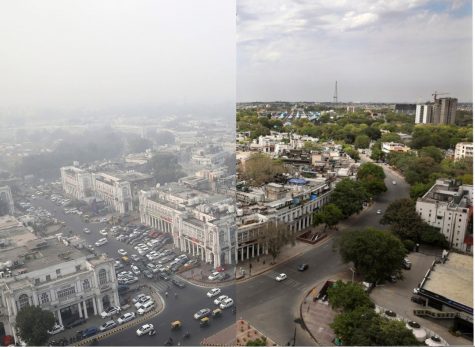The reality of the air we breathe
January 27, 2021
Air pollution kills an estimated seven million people worldwide every year, according to the World Health Organization. Multiple countries have air qualities that are considered hazardous or unhealthy. Air pollution is on the rise with no sign of slowing down. Nevertheless, an unprecedented event gave us a slight glimpse of what could happen if we have a sense of urgency regarding our environment.
During the heart of the Covid-19 lockdown, smog cleared up over downtown Los Angeles. Air pollution normally obscures the skyline, however since the start of the quarantine, nitrogen levels have plummeted. As people stayed inside, the environment was changing.
Governments worldwide introduced travel and industry restrictions in the early part of 2020 to slow the spread of the Coronavirus pandemic. The atmospheric chemists of the world, those who study the chemistry of the Earth’s atmosphere, saw hope in the wake of the turbulent times the world was and still is facing.
They found that as big cities and nations imposed lockout measures to curb the outbreak of the coronavirus, air pollution had fallen to unprecedented levels throughout the world.
“Out of these extraordinary circumstances, we can see how changes in our society’s activities can have a momentous impact on our environment and the air we breathe,” said Kelsey Duska in a CNN article.
Major cities around the globe had seen immense decreases in air pollution during the period where most of the world was on lockdown. IQAir, a global air quality information and tech company, reported that there were reductions of about 60 percent of deadly particulate matter in the atmosphere compared to 2019.
Kymberli Samuel, a youth environmental activist, says that the lockdown was an eye opener for many and revealed how polluted some parts of the world actually are. “With the pandemic going on many people forgot about a lot of the raging issues around the world and pollution is a big one. It’s kind of a pandemic inside a pandemic if you think about it,” she said. Kymberli, who started an environmental justice club at her high school, understands the importance of having an environmentally-sound world.
“If a few weeks of minimizing our use of things that pollute the environment drastically changed the air quality in some parts of the world, imagine if we had some sort of lockdown every couple of months,” she added.

The decrease of harmful pollutants in the air seemed like a huge step in the right direction towards a more environmentally conscious world, but was it enough? Have we continued what was started during the midst of the Covid-19 lockdown?
The answer is no.
Carbon emissions did plummet due to lockdowns that have severely limited transportation and manufacturing; however, this has only slowed the average growth in concentrations of pollutants slightly.
According to the World Meteorological Organization (WMO), a United Nations agency responsible for atmospheric science and climatology, “The global response to the Covid-19 crisis has had little impact on the continued rise in atmospheric concentrations of CO2.”
Ms. Brown, who teaches science and health at the iSchool, sees the silver lining of the lockdowns, but is worried that it won’t last. “We have definitely reduced emissions of carbon dioxide during the pandemic because of the lockdown measures and the fact that people are not traveling around as much,” she said. However, “emissions will quickly go back to pre pandemic levels if we don’t pass legislation and make real structural changes to our energy sources and food production mechanisms to help reduce our greenhouse gas production,” she added.
Many have heard about the fact that air pollution is not safe, but many do not seem to realize the dire implications that could arise if air pollution is not taken seriously.
If polluted air is left to its own devices, the surface of bodies of water and soil will directly be polluted. It may destroy crops or decrease their yield. It is capable of destroying young trees and other species according to National Geographic.
“Many people, especially people in the United States take the air we breathe for granted,” said former Purafil employee Olivier Moroz. Purafil is an air filtration company that engineers products to protect people and environments. “Many citizens of middle eastern and asian countries do not have the luxury to have clean air. Breathing contaminated air can be fatal and no person should have to live in a place where they have to worry about whether or not they have safe air to breathe,” he said.
Although the air quality is still extremely high in some parts of the world, the lockdown was a phenomenon that gave us a starting point that must be built on. The glimpse of a clean air world that many of us witnessed in the early part of last year is only the tip of the iceberg.
